Violent crime, and especially murder, has become a prevalent and rising threat to the Palestinian communities within the territories that have been held by Israel since 1948. This violence impacts the Palestinians who succeeded in staying on or near their lands after the 1948 Nakba, and who are now known as ’48 Palestinians, or Palestinians with Israeli citizenship.
An NGO named “Abraham Initiatives” has been tracking the data of this violence. On June 25, it reported that there have been 99 Arab fatalities due to crime and violence since the start of this year (I subtracted seven cases in occupied East Jerusalem). This is compared to 44 in the same period last year. Beyond the numbers, there are daily tragedies of the victims and their families and a whole society terrorized by crime and fear.
This trend has been on the rise for several years. According to Wikipedia (in Hebrew), in the years 2018-2020, the number of murdered Arab males per capita in Israel was 21.88 times higher than that of Jewish males. According to the same source, in the years 2018-2022, when the murder victims were Arab, there was an indictment in only 29% of the cases. By contrast, there were indictments in 69% of the cases when the victims were Jewish.
The reasons are well-known and have been analyzed extensively by many scholars. It is the reality and result of a society under racist colonialism, where the traditional economy and social institutions have been destroyed, and many poorly educated youths find themselves deprived of any way to make a decent living. Add to this the discriminatory and racist policies of all the state institutions, not the least of which is the Israeli Police, which treats any Arab as an enemy and is more likely to shoot him rather than defend him as a victim.
Most damningly, according to many Palestinian analysts, the problem is not just one of destitution, discrimination, and neglect. In an in-depth investigation by the Israeli site “zman.co.il” from 2019, people with firsthand knowledge, including a retired police officer, described a situation where the all-powerful Israeli security services (Shabak) provided impunity to Arab criminal gangs in return for their cooperation against Palestinian national activities. Later, on June 30, 2021, Maariv reported that a senior officer in the Israeli police claimed, in a meeting of the Police national command, that most of the severe crimes in Arab society are performed by “Shabak collaborators,” which would corroborate this claim. The officer in the Maariv story said the Police simply could not touch these criminals, as the Shabak provided them with impunity.
Haifa demonstration
The mounting distress in the ’48 Palestinian society, as the news of murdered people keeps streaming in almost every day, is producing pressure on the leadership to act. The local leadership is divided between those political parties that are represented in the Israeli Knesset, which have been somewhat discredited by internal splits and futile attempts to gain “influence” within the mechanisms of Zionist “Jewish Democracy,” and grassroots movements that boycott the Knesset (The Islamic Movement and Abna’ al-Balad), who are more vigorously persecuted by the Israeli state. All these parties and many more elements of Palestinian society are organized in the “High Follow-Up Committee,” which is the sole body that can declare mass national demonstrations and general strikes of the Arab population in ’48 Palestine. As part of a long series of mass protests against the rising murder wave, this follow-up committee called for a national demonstration in Haifa on Saturday, June 24.
Events rarely move according to an organized political schedule, and after the Haifa demonstration was declared, a massacre of five people in a car wash in Yafat an-Nasserah, near Nazareth, apparently by organized crime, jolted public opinion and caused a wave of Palestinian protest around the country. Other events occupied public opinion in the week leading to the scheduled demonstration, including a protest by the inhabitants of the occupied Syrian Golan Heights against the installation of wind turbines on their lands. The violent attacks by the Israeli Police against the Golan protesters led to more mass demonstrations around the country, mostly by the Druze communities, including a Herak demonstration in Haifa. In the same week, there was also a sharp intensification of the oppressive operations of the occupation forces in the West Bank, with many martyrs and mass pogroms by settlers against Palestinian residents, which led to more protests in ’48 Palestine.

As we gathered in Emil Habibi circle at the entrance of Wadi Nisnas in Haifa on Saturday afternoon, June 24, only the hardcore political activists showed up, not the masses. My activist friends from around the country noted that even most of the relatives of the murder victims, who led many of the past protests against violence and organized crime, were not present this time. On the other hand, there was a big presence of Jewish anti-occupation activists that are now very active in the protest movement against Netanyahu’s judicial reform. On this Saturday, many of them gave up participation in the Zionist opposition’s protest and joined the Palestinian demonstration. All in all, we were about a thousand demonstrators, about half Arabs and half Jews.
The political landscape for the protests against crime and violence is challenging and problematic. Naturally, it is the role of the police to prevent and fight crime, but the police are deeply racist and oppressive against the Palestinian population. Over the last decade, there has been a campaign by the state to build police stations in Arab towns, but people notice that when new stations are built, they intensify house demolitions and the collection of extortionary fines for procedural offenses while criminal activity flourishes and murders multiply. At the beginning of the current crime wave, some calls for more police presence in Arab towns were being voiced. But now, especially with the ultra-racist Itamar Ben-Gvir as the Minister for Internal Security (making him responsible for the police), demonstrators were this time protesting against the police rather than calling for police action.
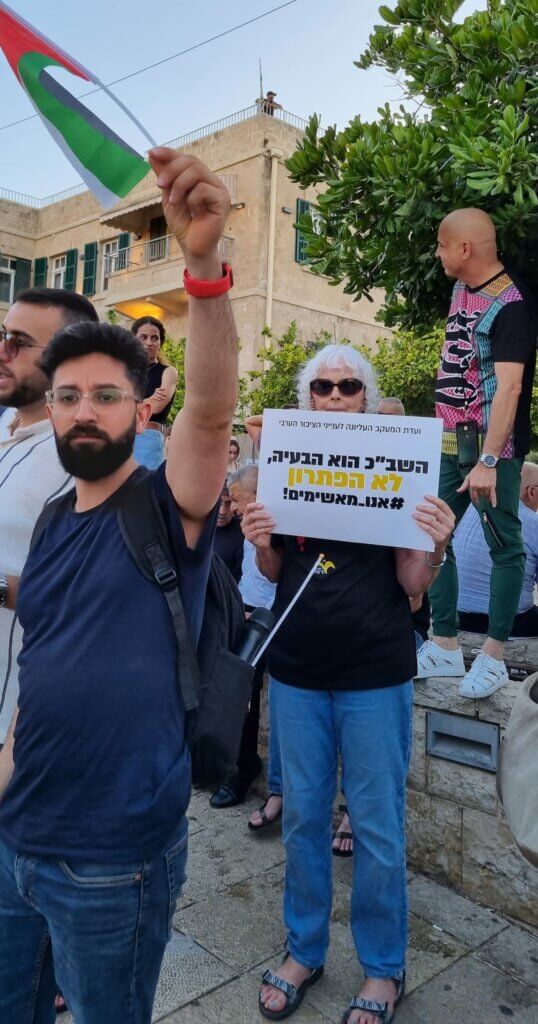
Within Israel’s internal discourse, whenever the total inaction of the police against crime in Palestinian society is raised, the most common proposal is to involve the “magic powers” of the Shabak. Perhaps the loudest message of the Haifa demonstration, which was raised in posters and by speakers, was that the racist Shabak is a big part of the problem and cannot be part of the solution.
One of the reasons why “the masses” did not join a demonstration concerning an issue of life and death that is high in everyone’s minds is that people don’t believe such a protest will change anything. The Israeli state, with all its security apparatus, is only getting more blatantly racist by the day, and has no wish to appease Arab public opinion.
In fact, being anti-Arab seems to be the greatest vote-winner in Israeli politics.
There have been some attempts within Palestinian society to organize to resist organized crime internally, but this requires a much higher level of organization and is very dangerous. The most famous such attempt was the establishment of a local security company in Kafr Qasim. Now, we only hear about it occasionally when the police attack the local guards, claiming that they violated the criminal’s rights (see, in Hebrew, here and here).
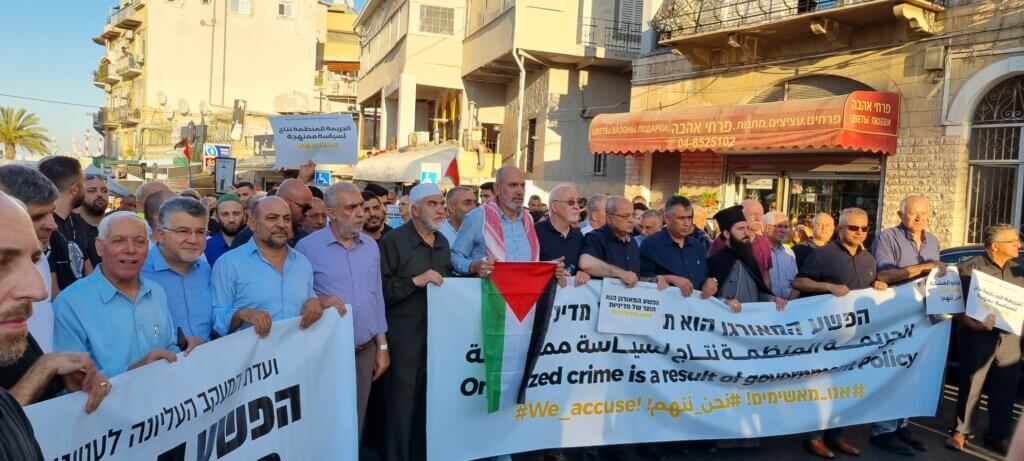
The struggle over raising the Palestinian flag
In the last half-year, Palestinian demonstrations in Haifa rarely end peacefully. For decades the Haifa police used to tolerate most Palestinian demonstrations, even some that marched through the streets of Wadi Nisnas and the German Colony. Violent attacks on demonstrations were the exception during important events every few years, like protests during the beginning of the Second Intifada (October 2000), protests against major attacks on Gaza (2008, 2014, 2018), and the protests against the Prawer ethnic cleansing plan in the Naqab (2013). But, for the last few years, the Haifa police decided to use force to prevent any unauthorized Palestinian march in the city. For any small demonstration organized by Herak Haifa, they now mobilize large forces to shut it down, a policy that culminated in the violent attack on a Herak demonstration in the German Colony on May 9, 2021, which led to a week of clashes around the city.
In December 2022 after the last elections, but even before Ben-Gvir took command of the police, the Haifa Police commander, Deputy Superintendent Haim Azrad, initiated a new policy to violently prevent the raising of the Palestinian flag. In the period between December 17, 2022, and June 22, 2023, there were twelve Palestinian demonstrations in Haifa. Palestinian flags were raised in all of them; the police violently attacked the demonstrators every time. In nine of the twelve demonstrations, the police also detained some of the demonstrators, releasing them after a few hours since raising the Palestinian flag was not yet officially illegal. In three cases, police violence was so severe that some demonstrators required treatment at the hospital.
![A protester holding a poster that says, "Confiscate [Guns], Not [Palestinian Flags]" at a demonstration organized by the High Follow-Up Committee in Haifa, June 24, 2023. (Photo: Yoav Haifawi)](https://mondoweiss.net/wp-content/uploads/2023/06/Confiscate-guns-not-flags-20230624_191839-699x1024.jpg)
When Reem Hazan, the secretary of the Communist party in Haifa, secured the license for the follow-up committee demonstration, the officers warned her that raising Palestinian flags was strictly forbidden. They kept calling her in the days leading up to the demonstration, threatening that “if there will be any Palestinian flag, there will be detentions.”
As the demonstrators started marching from Emil Habibi Circle along Allenby Street, on the first line with all the official leadership of the follow-up committee, Muhammad Kana’aneh, one of the leaders of Abna al-Balad, raised the Palestinian flag. Police commander Azrad approached them with his men, but many people gathered around the flag, and Azrad understood that this time his officers would find it hard to reach their target. Azrad changed tactics, took a few steps back, and blocked the street. He announced that he would not let the demonstration proceed as long as the flag was raised. People were quite happy to continue demonstrating in the blocked street, and finally, the police withdrew until the demonstration proceeded as planned.
From Allenby Street, the demonstration poured into the German Colony and marched to the Prisoner’s Square – the site of most Palestinian demonstrations in the city. When we arrived at our destination, there were already many Palestinian flags, big and small, all along the human stream, and the police, for the first time this year, passively accepted their presence.
Even if this demonstration would probably do nothing to reduce the crime wave, it registered an important symbolic victory for the struggle over the Palestinian flag and for the defense of Palestinian identity.
Yoav Haifawi
Yoav Haifawi is an anti-Zionist activist and maintains the blogs Free Haifa and Free Haifa Extra.
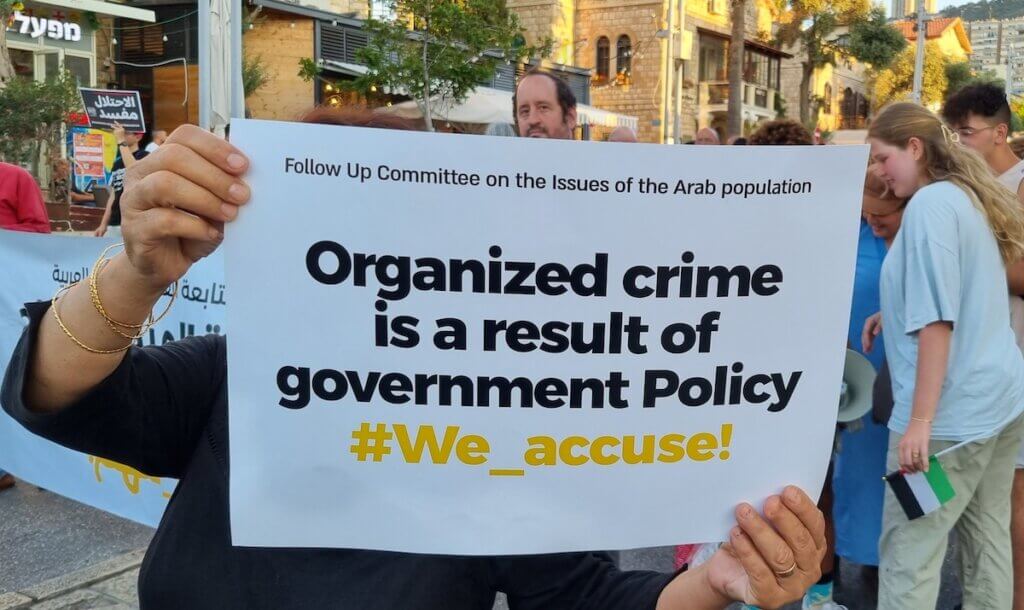
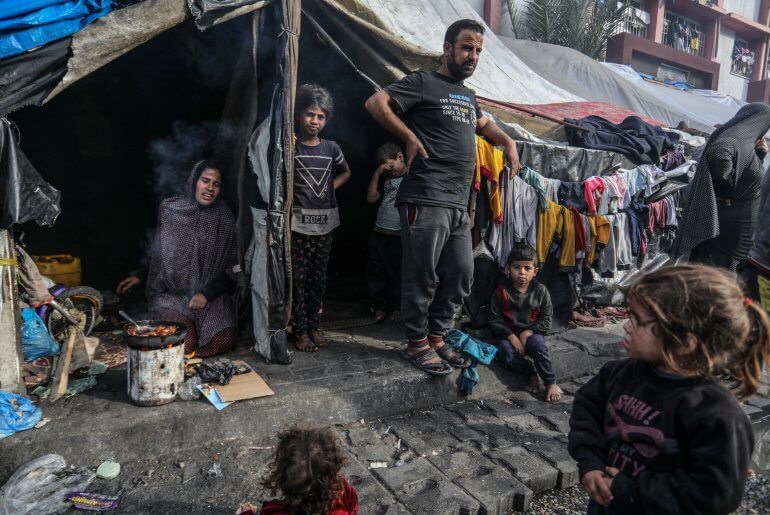
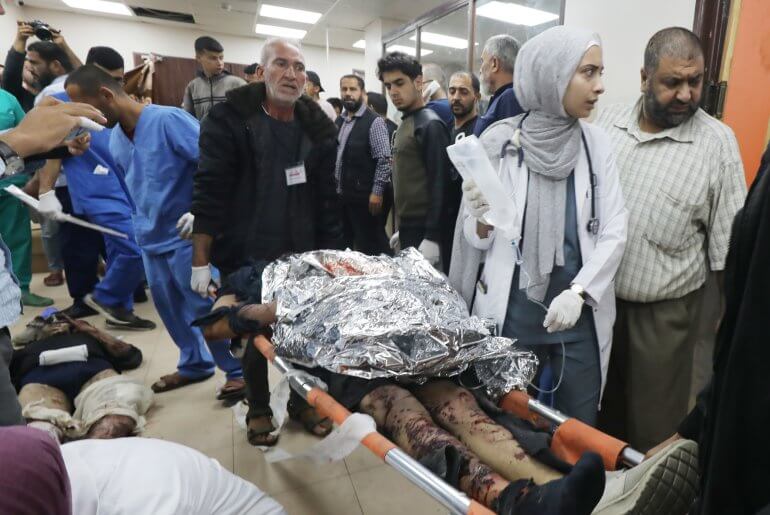
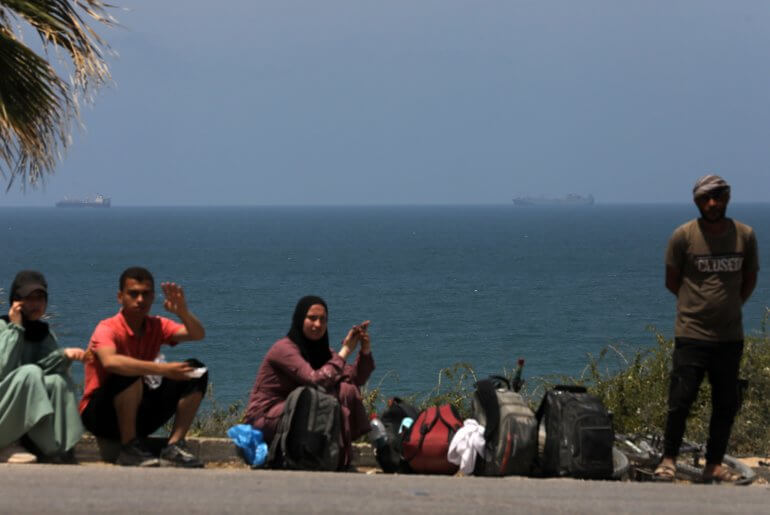
Cultivating crime in Palestinian society is a form of sociological warfare.